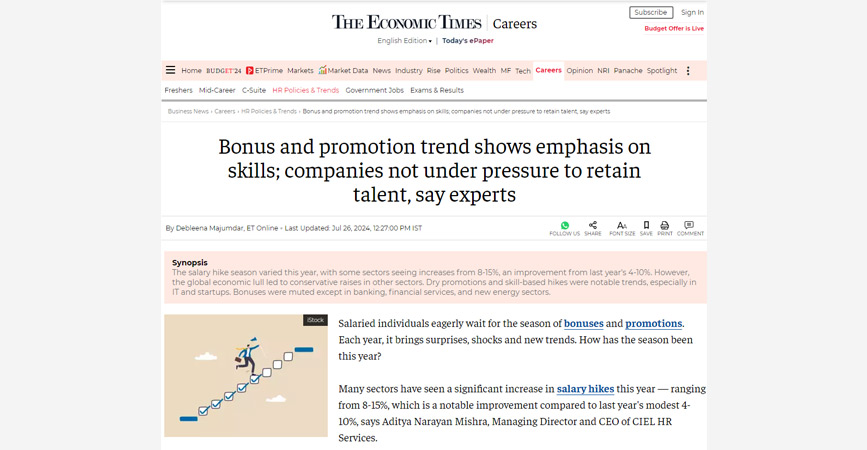
Synopsis: The salary hike season varied this year, with some sectors seeing increases from 8-15%, an improvement from last year’s 4-10%. However, the global economic lull led to conservative raises in other sectors. Dry promotions and skill-based hikes were notable trends, especially in IT and startups. Bonuses were muted except in banking, financial services, and new energy sectors.
Salaried individuals eagerly wait for the season of bonuses and promotions. Each year, it brings surprises, shocks and new trends. How has the season been this year?
Many sectors have seen a significant increase in salary hikes this year — ranging from 8-15%, which is a notable improvement compared to last year’s modest 4-10%, says Aditya Narayan Mishra, Managing Director and CEO of CIEL HR Services.
Companies in consumer products, services, hospitality, financial services, supply chain and funded startups have set their salary hikes at the higher end of the range, Mishra explains. Others have been conservative with hikes because of a general lull in the global economy.
Harold D’Souza, Co-Founder and Director, WalkWater Talent Advisors, has a cautious view for the year: “Bonuses this year are likely to be muted except in the banking and financial services sector and for parts of the infrastructure sector, especially energy and new or green energy related.”
The trends in promotions this year
The other key shift all professionals look for during the year is the chance for an upward movement in their roles and new designations to match that move.
On that front, Mishra says as IT services and many startups are facing an economic slowdown and funding constraints, bonuses are not high. He also sees a trend of “dry promotions” — a rise in designation without a pay raise.
Dry promotions can result in a superficial increase in a designation. It can result in more responsibilities. While in some cases that can lead to increased learning, a chance to upskill and a chance to get leadership roles, a prolonged spell of dry promotions can lead to resentment and attrition.
Mishra points out another upcoming trend: Some companies have been distinguishing hike percentages based on the skills. For instance, in the IT industry, employees with new-age skills are receiving more attractive hikes than those with legacy skills. “We observe that talent identified as having potential for the future and possessing above-par soft skills are being rewarded with better hikes, along with various other retention tools,” he says.
What is clear is that skills are getting more clearly correlated with hikes.
D’Souza agrees, adding that promotions will be very selective and limited as there is no significant pressure on companies to retain talent. The job market is muted and slow at leadership levels. As senior candidates do not have multiple opportunities, bonuses and promotions will be lower.
While funding is starting to flow back again to startups, he says it will take time to reach a level where pay raises can be rolled out. He sees the growing sectors as parts of industrial and infrastructure, energy, roads, railways, banking and financial services. The luxury goods segment is also seeing growth, he adds, which points to increased consumer spending for high-end goods.
Source: The Economic Times








